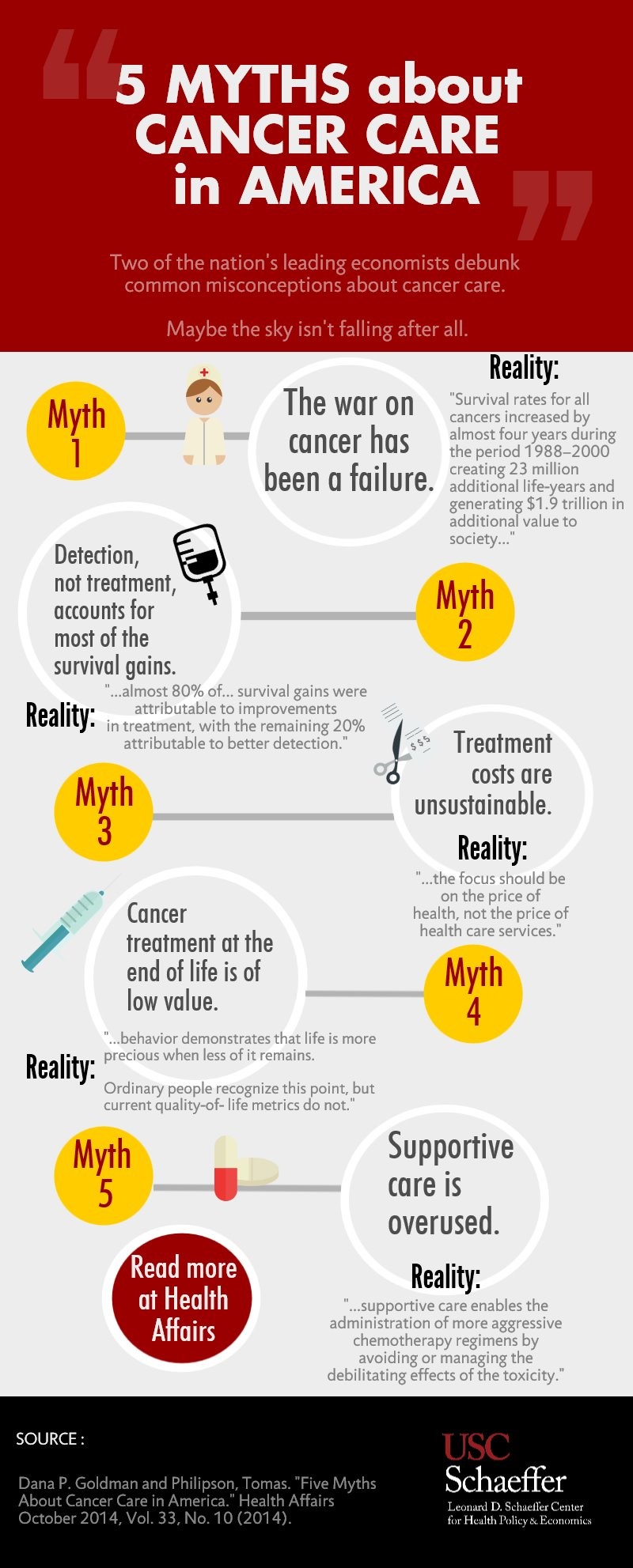5 Myths about Cancer Care
 In this month’s Health Affairs, leading health economists Dana P. Goldman and Tomas Philipson challenge five myths about cancer care. To the right we have an infographic that explains them very clearly.
In this month’s Health Affairs, leading health economists Dana P. Goldman and Tomas Philipson challenge five myths about cancer care. To the right we have an infographic that explains them very clearly.
The most economically interesting one is the fourth. This appears to challenge the notion that we should be skeptical about paying high prices for therapies that might buy only a short time of good life. (In health-economics, we use terms like Quality-Adjusted Life Year [QALY] and Disability-Adjusted Life Expectancy [DALE].)
The classic approach to these calculations was illustrated by Professor Christopher Conover in a recent article:
…[M]ost of the gains were concentrated in the 35-64 age group, which narrows the plausible range of what the average gain in life expectancy might be. Someone who is 60-64 is 7.3 times as likely to die in a given year as someone age 35-39. The reason this matters is that there are reasonably well-accepted rules of thumb about the value of what’s called a quality-adjusted life year (QALY).
But of course an infant whose life was saved in 1990 had a life expectancy of about 75 years, meaning the real cost was $87,000 per added year of life. In contrast, today’s 50-year-old only has an added life expectancy of 31.4 years, meaning that Massachusetts implicitly spent $106,000 per added year of life assuming the average person who would have otherwise died was 50 years old.
Goldman and Philipson are not quite talking about that scenario, but a similar one. Whatever a person’s age, if a medicine can buy only a few weeks or months of good life, should taxpayers pay for it? I doubt that is a question that can be answered in a socialized system. In a system of private insurance where we did not skulk around avoiding these embarrassing questions, each person could pay for the insurance policy that suited his preferences. I alluded to this in my previous discussion of Dr. Zeke Emanuel’s desire to die at age 75.


“Behavior demonstrates that life is more precious when less of it remains.” Interesting choice of words.
I agree that this is a very important and very tough question.
However, I wonder if you have kind of painted it over with the libertarian formula that “each person could pay for the policy that suited his preferences.”
Professor Clark Havighurst of Duke seemed to demolish this formula (in my eyes, at least), when he wrote about the exact problem of signifying preferences.
I have zero history of cancer in myself or my family. If I could save $300 a month by choosing a health insurance policy that did not cover chemotherapy, I would be tempted to do make that choice.
But if I were suddenly hit with a diagnosis of cancer, my loving family would tear me up alive for having made this choice.
Because of this, I think, the govt mandates that all policies cover chemotherapy.
Comments welcome! I think that the libertarian formula is inadequate, at least without further clarification.
In my opinion the myths discussed earlier are valid points but there is a underlying fact….that the recommended treatments for cancer are not 100% sure to cure a person of cancer. It is true that if your insurance does cover medicine and treatment costs that it does considerably increase ones life expectancy and with recent advancements in the medicine and research economy it is improving life expectancy after the disease goes into remission.But discipline is ultimately a key factor in overcome this disease.
I have no history of this disease but I am aware of many of the effects of it. While there is controversy about paying higher insurance premiums for the extra cover, should one be confronted with cancer in the future it could be beneficial to you and your family.
In the end before making any decisions in payments, surgeries, medicine and treatments are influenced by personal beliefs, age, preferences,statistics,public information and ones own will, in order to determine the course/road taken forward.
I agree that life becomes more important and meaningful when little of it is remained. People shouldn’t hesitate to spend whatever it takes on the cancer. Because if a good treatment can give you few more days to life then its worth it because nothing is more precious than life.